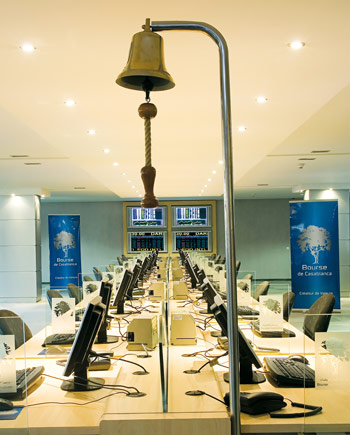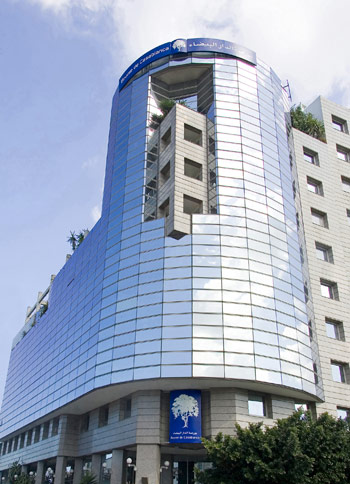Morocco Capital Markets: Market for Companies and Investors in Morocco
CEO of Casablanca Stock Exchange, Karim Hajji
For 2011 I think the market will see a 15% rise after a 22% rise in 2010. We also expect to see 6-7 IPOs in 2011 as we only saw 2 in 2010 which was a year of consolidation.
Interview with Karim Hajji, CEO of Casablanca Stock Exchange

Market capitalization of the stock exchange topped 50 billion Euros at the end of November 2010. What is your frank assessment of Morocco’s capital markets?
Morocco is the third largest capital market in Africa after South Africa and Egypt and we have been growing steadily since 1993 when we underwent major reforms driven by the Ministry of Finance for capital markets. This created a new limited company where the shareholders were stockbrokers and also a central depository, and the CDVM as the market authority. In 2010 we multiplied our market cap by five compared to 2000, with major IPOs, such as Maroc Telecom, one of the largest telecom companies in Africa that accounts for 23% of market cap and Addoha, the largest real estate company in Morocco. Morocco has today many large listed companies that are followed by money managers worldwide.
What is the perception of the Casablanca Stock Exchange and Morocco’s capital markets by the business community in Morocco as a means to raise finances and what is the perception of the large international investment companies?
For the Moroccan investment community the CSE is a place to invest for the long-term. A Moroccan institutional investor cannot invest more than 10% of his assets abroad; therefore the main outlet for investments is the CSE. Our main investors are from Morocco. Traditionally Morocco has been a market where banks ensure most of the long-term financing for companies so our challenge is to show them how capital markets (like the stock market) can help finance their investment needs. We have a long way to go to be more comparable to the US or European markets and today the stock market only finances around 10 to 15% of companies‘ investment needs and our goal is to triple that in the next ten years.
Why do companies need more persuasion in order to raise finances in this way?
Some entrepreneurs fear that by being listed they may lose control over their companies and they are also concerned about disclosing their financials to competitors. Our goal is to convince them that by going public they will be able to raise money to finance their growth without losing control and I think we have good testimonials for this. Last year we even attracted one Tunisian company to our market.
What are the measures taken by the in order to improve reporting, transparency, and sophistication of the market?
“
For 2011 I think the market will see a 15% rise after a 22% rise in 2010. We also expect to see 6-7 IPOs in 2011 as we only saw 2 in 2010 which was a year of consolidation.
“
We are working very closely with the market authority to improve these things. The first thing we have done is to publish the companies’ financials in English so today any investor can access the information in French, English, or Arabic. Also we have organized a forum for the listed companies on corporate communication because we feel this is an area where we really need to improve. CDVM is also sanctioning companies that do not comply with reporting requirements.
You mentioned the creation of FTSE and CSE Morocco 15 index and all-liquidity index which is an important step towards the internationalization of the CSE.
This is a very important step because it is a real partnership and the aim is to give more visibility to the CSE worldwide and to enable fund managers in the country and abroad to create ETFs (exchange traded funds) to use as an index benchmark. With the FTSE all share and liquidity 15 index we have two indices that will be more easily replicated than the current indices. We think this is a strong step towards achieving more international visibility and to improve liquidity in our markets through ETFs. Foreign investors will be able to track the CSE performance. The FTSE performance data goes back to June 2007.
|
loading the player….
|
What are some additional services and products that you think will be necessary to add further sophistication?
We are working closely with the market authorities to put the derivatives market into place and hopefully we should see the first law enacted by April or October 2011. It will take 18-24 months to establish an operating market once the regulations are enacted. Derivatives allow insurance companies and banks to hedge their risks on capital markets. The CDVM is keen on protecting investors and in the first phase they will want to make sure only institutional investors can buy or sell derivatives on the market and they will want to protect the market from too much speculation.
How have you been impacted by the global economic crisis? What is the outlook for the stock exchange and for capital markets in Morocco?
The CSE has not been too negatively affected by the crisis and in 2008 we had a drop of only 13.4% compared to 40-60% for most other emerging markets. This was due to many factors like Moroccan banks not being exposed to sub-primes because of the current foreign exchange controls that do not allow Moroccan investors to engage in investing more than 10% abroad and because we did not have too many foreign institutional investors at the time. Overall the market was pretty resilient and in 2009 we only had a 6% drop and our average performance over 2008-2009 remained one of the best that among emerging markets. The economy faired well and in 2008 and 2009 our growth rate was close to 5%.
How do you forecast the economy in Morocco? Would you say the companies in Morocco are undervalued and is it the right time to invest?
They are properly valued given their current growth prospects and the economy is still growing at an average rate in excess of 4%. For 2011 I think the market will see a 15% rise after a 22% rise in 2010. We also expect to see 6-7 IPOs in 2011 as we only saw 2 in 2010 which was a year of consolidation. 
What are some of the incentives being offered for companies to list their companies?
We have tax incentives for companies going public. Any company that sells existing shares can get a 25% rebate on its income tax for the next three years after the introduction until 2013. Any company that issues new shares gets a 50% tax rebate so it’s quite an incentive and everyone wins with these measures.
You mentioned there will be around six IPOs in 2011. What will they be?
They will be mostly Moroccan companies. We are still looking towards certain countries and we are looking at Tunisia for the future once their situation stabilizes otherwise we will also look towards other African countries.
By 2015 you aim to double the number of listed companies, quadruple the number of investors, and transform the CSE and make Morocco into an African investment hub. How would you define your strategy and how feasible are these targets?
Doubling the number of listed companies will be challenging but is achievable by introducing 10-15 companies a year. Today we don’t have enough investors but we have taken action to attract more and also made efforts to contribute to financial education in the media and we will create an educational program on the CSE to inform the people and raise interest in our market. We are active in financial education and last month we held a conference on this and many people attended. We are partnering with John Hope Bryant to raise awareness in the MENA region and we are working on translating the materials for the Hope Foundation into French and Arabic so they will be available on our website and Wikipedia.
|
loading the player….
|
What are your expectations from this financial education and what would you like to achieve?
We feel like we have a social responsibility to raise awareness about financial issues because many Moroccans do not understand the language of money and that this is crucial for success. This spans from educating people on the market, setting family budgets, purchasing a home, or investing in the market- it covers all areas. Only one out of two Moroccans has a bank account and the Central Bank is currently keen on improving access to banking to more people in Morocco. I think this will contribute positively to the financial education of our citizens.
What is your message about Morocco?
Morocco is a very stable country under a constitutional monarchy and the governance is improving every year. Every year it becomes easier to do business, we are attracting more investment, and tourists- last year we had 9 million and we are planning to reach 20 million by 2020 and be among the top 20 destinations in the world. I really believe Morocco has a lot to offer to tourists due to our history, landscape, hospitality, food, and stability. We believe this sector will drive the rest of the economy and is one of our main assets.